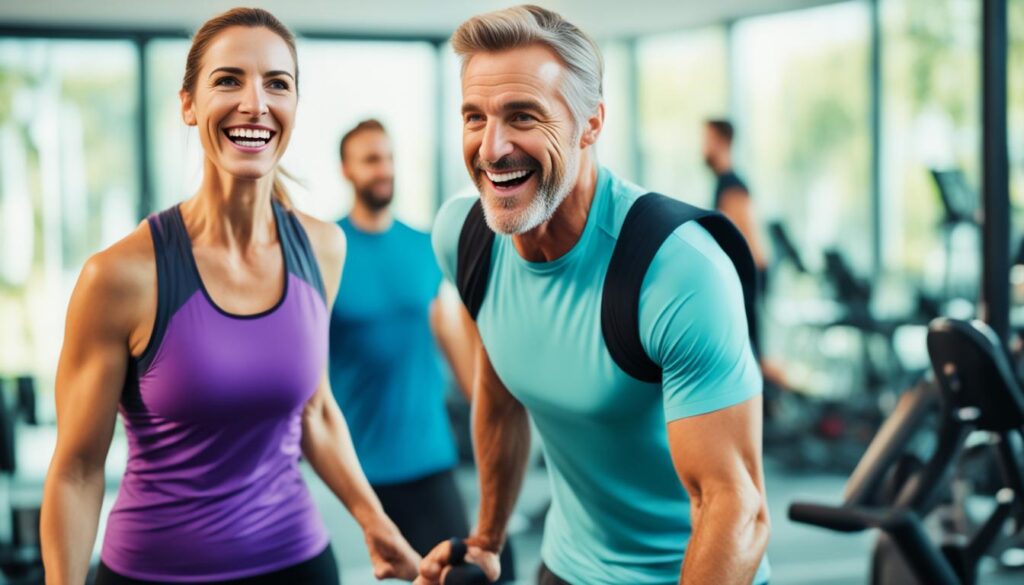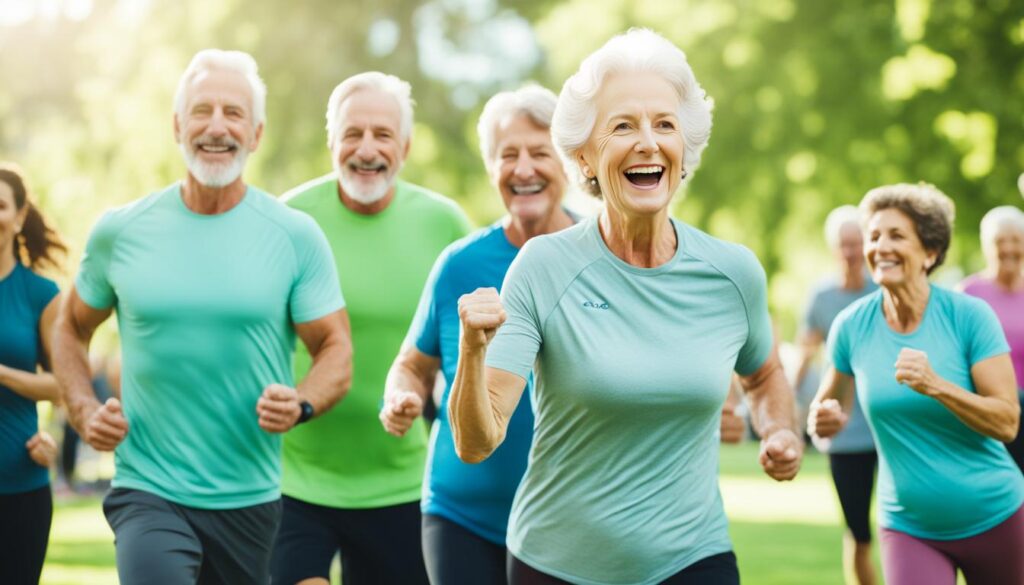5 Social Benefits of Exercise: Enhance Well-Being!
Hi there! Have you ever thought about the social benefits of exercise? Well, I have a story to share with you that might resonate. A few months ago, I found myself feeling isolated and disconnected from the world around me. The stresses of everyday life had taken a toll on my overall well-being, and I knew I needed a change.
That’s when I decided to start going to the gym. Little did I know that this simple decision would not only transform my physical health but also have a profound impact on my social life. The gym became more than a place to exercise – it became a hub of social connection and support.
As I began attending fitness classes and engaging in workout routines, I discovered a whole new world of social benefits that exercise brings. I found myself making new friends, building lasting relationships, and feeling a part of a community that genuinely cared about each other’s well-being.
It’s amazing how exercise can bring people together, isn’t it? And the best part is, these social advantages are not limited to just my personal experience. They are backed by research and experienced by countless others who have made exercise a regular part of their lives.
In this article, I want to share with you the five social benefits of exercise that I discovered firsthand. From improved mood and increased social engagement to a sense of community and support, exercise has the power to enhance our overall well-being in more ways than we can imagine.
So, let’s dive in and explore how exercise can not only transform our bodies but also enrich our social lives. Together, we can unlock the incredible potential of exercise to enhance our well-being and create meaningful connections with others. Are you ready?
Key Takeaways:
- Regular exercise offers several social advantages, such as improved mood and increased social engagement.
- Exercise can reduce stress, improve mental health, and provide a supportive environment for personal growth.
- Joining fitness communities and workout groups can lead to lasting friendships and a sense of belonging.
- Having a workout partner or attending fitness classes can increase accountability and motivation.
- Exercise provides an excellent opportunity to improve communication skills and teamwork, which can be applied to various areas of life.
Improved Mood and Increased Social Engagement
Exercise has a remarkable impact on our mood and social interactions. When we engage in physical activity, our bodies release endorphins, which are natural mood boosters. These endorphins can work wonders, making us feel happier, more relaxed, and more inclined to connect with others.
Regular exercise not only improves our physical well-being but also enhances our emotional state. Whether it’s going for a run, attending a fitness class, or participating in team sports, any form of physical activity can have a positive effect on our mood.
When we feel good about ourselves, we become more open and engaging in social situations. Exercise helps break down barriers, allowing us to connect with others more easily. Whether it’s striking up conversations with fellow gym-goers or joining a group fitness class, exercise provides countless opportunities for social engagement.
Gym anxiety can often hinder our social interactions. The fear of judgment and the pressure to perform can make it challenging to engage with others. However, regular physical activity can help alleviate gym anxiety, creating a more comfortable and inclusive environment for social interactions.
In fact, exercise is a great way to overcome social anxiety and boost self-confidence. As we become more physically fit and achieve our fitness goals, we develop a sense of pride and self-assurance. This newfound confidence naturally translates into our social interactions, making us more outgoing and willing to connect with others.
Benefits of Improved Mood and Increased Social Engagement:
- Enhanced happiness and relaxation
- Reduced stress and anxiety
- Improved self-confidence and self-esteem
- Opportunity to meet new people and form connections
- Expanded social network and support system
- Increased sense of belonging and community
Exercise has the power to transform not only our bodies but also our social lives. By improving our mood and increasing social engagement, regular physical activity can enhance our overall well-being and quality of life.
Stress Reduction and Improved Mental Health
When it comes to taking care of our overall well-being, it’s essential not to overlook the impact of exercise on our mental health. Regular physical activity is not only beneficial for our physical fitness but also plays a crucial role in reducing stress levels and improving mental health.
Exercise has long been recognized as an effective stress reliever. When we engage in physical activity, our bodies release endorphins, which are often referred to as “feel-good” hormones. These endorphins help elevate our mood, reduce feelings of stress, and promote a sense of well-being.
Moreover, exercise can be particularly beneficial for individuals experiencing symptoms of depression and anxiety. By incorporating regular exercise into their routine, individuals may experience a reduction in the severity of these symptoms, leading to improved mental health and overall quality of life.
Exercise as a Natural Antidepressant
Research has shown that exercise can be as effective as certain medications in treating mild to moderate depression. Physical activity stimulates the release of neurotransmitters such as serotonin, which is known to regulate mood and promote feelings of happiness and relaxation. By increasing serotonin levels through exercise, individuals may experience a natural antidepressant effect, helping to alleviate symptoms of depression and improve mental well-being.
In addition to its antidepressant effects, exercise also helps to reduce anxiety levels. Engaging in physical activity can serve as a healthy distraction, allowing individuals to focus their attention on the present moment and diverting their thoughts away from anxiety-inducing thoughts or situations. Moreover, exercise promotes relaxation and can help individuals to manage their anxiety by releasing muscle tension and promoting a sense of calmness.
The Mind-Body Connection
Exercise not only benefits our mental health directly but also fosters a strong mind-body connection. When we engage in physical activity, we become more attuned to our bodies and develop a heightened sense of self-awareness. This connection allows us to better understand and manage our emotions, making us more resilient when faced with stressful situations.
Furthermore, regular exercise improves sleep quality, which is fundamental for maintaining good mental health. Adequate restorative sleep reduces stress levels, enhances cognitive function, and boosts mood. By incorporating exercise into our daily routine, we can improve the quality of our sleep, leading to improved mental well-being and overall cognitive performance.
With all these benefits, it’s clear that exercise plays a crucial role in reducing stress and improving mental health. Whether it’s going for a run, practicing yoga, or joining a fitness class, finding an activity that suits your preferences and interests is key to reaping the mental health rewards of regular exercise.
| Benefits of Exercise for Stress Reduction and Mental Health |
|---|
| Reduces stress levels and promotes a sense of well-being. |
| Acts as a natural antidepressant by increasing serotonin levels. |
| Helps manage symptoms of depression and anxiety. |
| Serves as a healthy distraction and promotes relaxation to reduce anxiety levels. |
| Improves sleep quality, leading to better mental well-being. |
| Fosters a strong mind-body connection and enhances self-awareness. |
Opportunity to Meet New People and Form Lasting Friendships
Joining a gym or fitness class provides individuals with the opportunity to meet like-minded people with similar interests. Engaging in fitness activities not only promotes physical well-being but also fosters the formation of lasting friendships. By becoming a part of the fitness community, individuals can forge connections and create meaningful relationships that extend beyond the workout sessions.
Meeting new people in a fitness setting opens doors to exciting possibilities and shared experiences. The shared passion for an active lifestyle creates a strong foundation for building relationships that go beyond the gym walls. Whether it’s striking up a conversation during a group class or finding a workout buddy, the fitness community is a thriving hub of social interaction.
Forming lasting friendships within the fitness community offers various benefits. Not only do these connections provide support and accountability in achieving fitness goals, but they also contribute to overall well-being. Friends made in the gym can serve as motivators, pushing each other to reach new heights and stay committed to healthy habits.
“The gym has become my second home, and the friendships I’ve formed here have become like family. We support each other’s fitness journeys and celebrate each other’s achievements. It’s truly a community like no other.” – Emily, gym enthusiast
Moreover, the fitness community offers a sense of belonging and camaraderie. Being surrounded by like-minded individuals who share a common passion for health and wellness fosters a supportive environment. Whether it’s exchanging tips and advice, participating in group challenges, or simply cheering each other on, the fitness community provides a strong support system that extends beyond the gym.
| Benefits of Meeting New People in the Fitness Community | Benefits of Forming Lasting Friendships |
|---|---|
|
|
Meeting new people and forming lasting friendships within the fitness community have a profound impact on both physical and mental well-being. These connections enhance the overall exercise experience, making workouts more enjoyable and gratifying. Moreover, the sense of camaraderie and support empowers individuals to push their boundaries and strive for continuous self-improvement.
Increased Accountability and Motivation
When it comes to fitness, staying accountable and motivated can be a challenge. That’s where having a workout partner or attending fitness classes can make a real difference. Working out with someone else provides a sense of increased accountability and motivation, pushing you to achieve your fitness goals.
Having a workout partner means that you have someone who is relying on you to show up and give it your all. It creates a sense of commitment and responsibility towards your fitness routine. Knowing that someone is counting on you can be a powerful motivator to stay consistent and give your best effort during each workout.
Additionally, working out with a partner can make your exercise sessions more enjoyable and fun. You can challenge each other, try new exercises, and provide support and encouragement throughout your fitness journey. Having someone to share your successes and setbacks with can make the whole process feel less daunting and more rewarding.
Joining fitness classes can also provide a similar sense of accountability and motivation. When you are part of a class, you become part of a community of like-minded individuals who are all there to improve their health and fitness. The energy and camaraderie in a class setting can be contagious, pushing you to work harder and stay consistent.
Remember, the key to increased accountability and motivation is finding a workout partner or fitness class that aligns with your goals and preferences. Whether it’s a friend, family member, or joining a local fitness group, having someone by your side can make all the difference in staying on track and reaching your fitness aspirations.

| Benefits of Having a Workout Partner | Benefits of Joining Fitness Classes |
|---|---|
| 1. Increased accountability | 1. Built-in accountability |
| 2. Motivation and support | 2. Motivating and energetic environment |
| 3. Variety and new exercises | 3. Access to professional guidance |
| 4. Fun and enjoyment | 4. Social connections and friendships |
Improved Communication Skills and Teamwork
Participating in group exercise settings not only benefits physical health but also provides an excellent opportunity to enhance communication skills and teamwork. Working together with others towards a common fitness goal can foster effective communication, active listening, and collaborative problem-solving. These skills are vital not only within the gym but also in various aspects of life.
When engaging in group workouts, individuals learn how to effectively communicate their needs, expectations, and goals to their exercise partners and trainers. Clear and concise communication ensures that everyone is on the same page and can make the most out of every workout session.
Listening to feedback is another essential aspect of communication. In a group exercise setting, individuals receive valuable input from their peers and instructors, allowing them to refine their techniques and push themselves beyond their comfort zones. By actively listening and implementing the advice, individuals can improve their physical performance and achieve better results.
Collaboration is a key component of teamwork, and it plays a significant role in group exercise sessions. Whether working together for partner exercises, coordinating movements in a dance class, or providing motivation and support during challenging workouts, teamwork fosters a sense of unity and shared purpose.
Quotes:
“In a group fitness class, I learned how to effectively communicate my fitness goals to my workout partner and follow the instructor’s cues. This improved my overall experience and motivation to push harder.” – Sarah, avid gym-goer
| Improved Communication Skills | Teamwork |
|---|---|
| Enhanced ability to express needs and goals | Collaborative problem-solving |
| Active listening to feedback | Support and motivation from workout partners |
| Clear and concise communication | Unified sense of purpose |
By actively engaging in group exercise, individuals not only improve their physical fitness but also develop valuable communication and teamwork skills. These skills can be applied in various areas of life, such as work projects, team sports, and personal relationships.
Sense of Community and Support
Regular exercise not only has physical benefits but also plays a crucial role in creating a sense of community and support. When we engage in fitness activities, we become part of a larger fitness community where like-minded individuals come together to pursue their health goals. This sense of community fosters a supportive environment for personal growth and motivation.
Being part of a fitness community allows us to connect with others who share the same health-conscious values and aspirations. We have the opportunity to meet people from various backgrounds and fitness levels, forming connections that go beyond the gym walls. These connections often extend beyond the exercise routines, providing a network of support and encouragement.
| Benefits of a Fitness Community | Description |
|---|---|
| Social Support | Being surrounded by supportive individuals who understand the challenges and triumphs of the fitness journey can provide the necessary encouragement to stay committed and motivated. |
| Motivation | The energy and enthusiasm of fellow community members can be contagious, inspiring us to push our limits and strive for our goals. |
| Accountability | Within a fitness community, we are held accountable for our actions and commitments. This creates a sense of responsibility and helps us stay consistent in our fitness routines. |
| Knowledge Sharing | Being part of a community provides opportunities for knowledge sharing, where we can learn from others’ experiences, exchange tips, and discover new fitness approaches. |
Through the connections we make in a fitness community, we find the support and encouragement needed to overcome challenges, celebrate achievements, and sustain the motivation to lead a healthy lifestyle. The sense of unity and shared purpose fuels our determination to reach our fitness goals and contributes to overall well-being.

Positive Role Modeling and Inspiration
Regular exercise allows individuals to become positive role models for others, inspiring family, friends, and children to adopt healthy habits and an active lifestyle. By prioritizing my own health and well-being, I can motivate and encourage others to do the same.
Leading by Example
When I make exercise a consistent part of my routine, others can see the positive changes I experience physically and mentally. Whether it’s my children, siblings, or close friends, they witness my commitment to healthy living and are inspired to follow suit.
By setting an example through regular workouts, I show others that prioritizing physical activity is not only beneficial for our bodies but also essential for overall well-being. Whether it’s going for a jog, joining a fitness class, or playing a sport, my dedication to staying active can motivate those around me to adopt healthy habits and integrate exercise into their daily lives.
Inspiring a Healthy Lifestyle
Being a positive role model goes beyond just physical fitness. It extends to inspiring others to embrace a well-rounded approach to wellness, including healthy eating habits and self-care practices.
“The best way to inspire others is to be the healthiest and happiest version of myself.” – Unknown
By demonstrating the benefits of a healthy lifestyle through my own actions, I can show others how to make positive choices that nourish their bodies and minds. It’s not about perfection; instead, it’s about making small, sustainable changes that lead to lasting results.
The Power of Inspiration
When individuals witness my dedication to maintaining a healthy lifestyle, they are inspired to overcome their own challenges and make positive changes. By sharing my fitness journey and the obstacles I’ve overcome, I can provide others with the motivation they need to start their own path toward wellness.
Moreover, through my actions, I can create a ripple effect in my community, inspiring others to prioritize their health and take the necessary steps to achieve their fitness goals.
| Benefits of Positive Role Modeling and Inspiration |
|---|
| Inspires others to adopt healthy habits |
| Creates a supportive community focused on well-being |
| Encourages others to prioritize their own health and well-being |
| Motivates individuals to overcome challenges and achieve fitness goals |
When I lead by example, I have the power to positively impact the lives of those around me. By prioritizing my own health and wellness, I become a source of inspiration and motivation for others to embrace a healthier lifestyle. Together, we can create a community that supports and encourages one another on our fitness journeys. Let’s inspire and uplift each other to reach our fullest potential!
Positive Social Norms and Healthy Choices
Regular exercise plays a vital role in promoting positive social norms related to physical activity and health. By engaging in fitness activities, individuals not only make healthy choices for themselves but also inspire others to do the same. These positive social norms encourage the adoption of healthy habits and create supportive networks that prioritize overall well-being.
When individuals prioritize exercise and make it a regular part of their lifestyle, they set an example for those around them. Seeing someone consistently making healthy choices and taking care of their physical well-being can inspire others to follow suit. By creating a culture of fitness and well-being, positive social norms are reinforced, making healthy choices the norm rather than the exception.
Supportive networks play a crucial role in helping individuals maintain their health and fitness goals. When individuals surround themselves with like-minded individuals who prioritize exercise and healthy choices, they can draw upon the support and motivation of these networks. Whether through a gym community, fitness classes, or exercise groups, supportive networks provide encouragement and accountability, making it easier for individuals to stay on track.
“Surrounding yourself with individuals who share your health-conscious values creates an environment that supports and motivates you on your fitness journey.”
These supportive networks not only provide encouragement but also serve as a platform for sharing knowledge and experiences. Individuals can learn from each other, exchange workout routines, and explore different healthy choices together. The diversity of experiences within a supportive network enhances individual growth and helps build lasting relationships based on shared goals and interests.
Achieving Fitness Goals Together
One of the significant advantages of having supportive networks is the opportunity to achieve fitness goals together. Whether it’s participating in group workouts, training for a marathon, or simply cheering each other on during individual workouts, the camaraderie fosters a sense of unity and shared achievement. Working collectively toward common goals strengthens bonds and creates a profound sense of connection within the community.
Benefits of Positive Social Norms and Healthy Choices
The positive social norms and healthy choices promoted through regular exercise have wide-ranging benefits:
- Improved overall well-being and quality of life
- Reduced risk of chronic diseases
- Increased energy levels and improved mood
- Enhanced self-esteem and self-confidence
- Reduced stress and improved mental health
- Greater resilience and ability to cope with challenges
- Increased motivation and commitment to personal goals
- Strengthened social connections and support systems
| Positive Social Norms and Healthy Choices | Benefits |
|---|---|
| Encourages healthy choices and behaviors | – Improved overall well-being and quality of life |
| Creates a supportive environment | – Reduced risk of chronic diseases |
| Inspires and motivates others | – Increased energy levels and improved mood |
| Fosters lasting relationships | – Enhanced self-esteem and self-confidence |
Implementing positive social norms and making healthy choices not only benefits individuals but also has a ripple effect on the larger community. By taking care of our own physical well-being and actively participating in supportive networks, we contribute to the creation of a healthier society as a whole.
Improved Self-Confidence and Body Image
Exercise has a transformative effect on self-confidence and body image. By shifting the focus from appearance to physical abilities, individuals can experience a profound boost in self-esteem. Achieving fitness goals and witnessing progress can instill a sense of accomplishment and pride in one’s body.
Regular exercise promotes discipline and routine, providing individuals with a sense of control over their bodies and lives. This newfound control fosters a positive body image rooted in strength, endurance, and overall fitness achievements. Instead of fixating on perceived flaws, individuals appreciate their bodies for what they can accomplish.
“Exercise not only changes your body. It changes your mind, your attitude, and your mood.”
Building a positive body image through exercise is a truly empowering journey. The focus shifts from a narrow emphasis on appearance to valuing overall health and functionality. This shift promotes a healthier relationship with one’s body and an improved sense of self.
Embracing fitness achievements as markers of self-worth allows individuals to build a strong foundation of confidence and self-assurance. It reinforces the understanding that beauty comes in all shapes, sizes, and capabilities.
Incorporating Fitness into Everyday Life
Here are some effective ways to incorporate fitness into your daily routine:
- Take the stairs instead of the elevator
- Go for a brisk walk during lunch breaks
- Join a sports team or recreational club
- Try a fitness class that aligns with your interests
- Set achievable fitness goals and track your progress
Remember, every small step towards a healthier lifestyle contributes to improved self-confidence and a positive body image. Start your fitness journey today and embrace the incredible benefits that exercise brings to both mind and body.
Conclusion
Regular exercise offers a multitude of social benefits that can greatly enhance our overall well-being and satisfaction with life. Engaging in fitness activities not only improves our physical health but also boosts our mood, reduces stress, and increases social engagement. By prioritizing exercise and making it a regular part of our lifestyle, we can enjoy the advantages of going to the gym and reap the benefits of exercise.
One of the key advantages of going to the gym is the opportunity to build lasting relationships. When we join a gym or fitness class, we have the chance to meet new people who share similar health-conscious values and interests. These connections can lead to lasting friendships and a sense of community within the fitness world. Being part of this supportive community provides us with a network of people who encourage and motivate us to reach our fitness goals.
Exercise also plays a significant role in improving our self-confidence and communication skills. As we achieve our fitness goals and see progress in our physical abilities, our self-confidence grows. Focusing on our physical abilities rather than appearance promotes a positive body image and enhances our overall self-perception. Additionally, group workouts and fitness classes provide opportunities for teamwork and communication, teaching us essential skills that can be applied to other areas of life.
In conclusion, regular exercise not only improves our physical health but also has numerous social benefits. By engaging in fitness activities, we can experience improved mood, reduced stress, increased social engagement, and the opportunity to build lasting relationships. So, let’s prioritize exercise, hit the gym or join a fitness class, and embark on a journey towards a healthier, more socially fulfilling life.
FAQ
What are the social benefits of exercise?
Regular exercise offers several social advantages, including improved mood, increased social engagement, and reduced gym anxiety. Engaging in fitness activities can also provide opportunities to meet new people and form lasting friendships within the fitness community.
How does exercise help reduce stress and improve mental health?
Exercise is a great stress reliever and can help reduce symptoms of depression and anxiety. By reducing these negative emotions, individuals are better equipped to navigate social situations and handle daily stressors.
Can exercise increase accountability and motivation?
Yes, having a workout partner or attending fitness classes can increase accountability and motivation. Having someone to exercise with can help individuals stay committed to their fitness routine and push them to reach their goals.
Does exercise improve communication skills and teamwork?
Exercise provides an excellent opportunity to improve communication skills, especially when participating in group workouts. Working with others in a fitness setting teaches individuals how to effectively communicate, listen to feedback, and collaborate. These skills can be applied to other areas of life, such as work and personal relationships.
How does exercise foster a sense of community and support?
Regular exercise can create a sense of belonging and foster a strong community with others who share the same health-conscious values. Being part of a community that supports and encourages one another can provide a supportive environment for personal growth and motivation.
Can exercise promote positive role modeling and inspiration?
Yes, regular exercise allows individuals to become positive role models for others, inspiring family, friends, and children to adopt healthy habits and an active lifestyle. By prioritizing their own health and well-being, individuals can motivate and encourage others to do the same.
Does exercise promote positive social norms and healthy choices?
Regular exercise promotes positive social norms related to physical activity and health. These norms encourage individuals to make healthy choices, engage in supportive social networks, and create an environment conducive to overall well-being.
How does exercise improve self-confidence and body image?
Regular exercise can significantly improve self-confidence and body image by focusing on physical abilities rather than appearance. Achieving fitness goals and seeing progress can lead to a sense of accomplishment and pride in one’s body. Regular exercise also promotes discipline and routine, giving individuals a sense of control over their bodies and lives.
What are the overall advantages of going to the gym and exercise?
The advantages of going to the gym and regular exercise include improved mood, reduced stress, increased social engagement, and the opportunity to build lasting relationships. Engaging in fitness activities also enhances self-confidence, improves communication skills, and creates a sense of belonging within a supportive community. Prioritizing exercise can lead to a healthier and more socially fulfilling life.
















It's great that you talked about how business insurance can provide financial protection against unexpected events and help ensure the…
I like that you mentioned how business insurance is essential for protecting your bottom line and the long-term viability of…